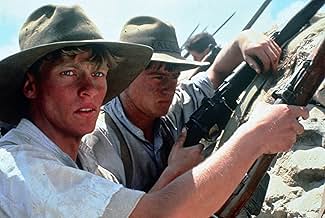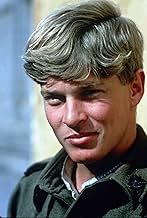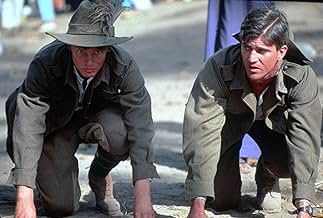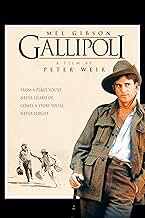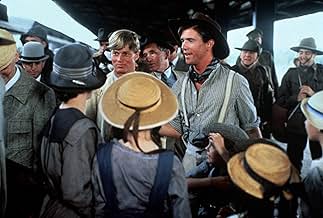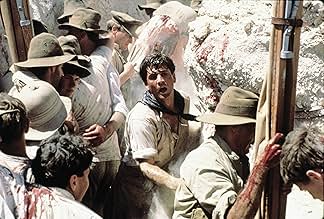Two Australian sprinters face the brutal realities of war when they are sent to fight in the Gallipoli campaign in Turkey during World War I.Two Australian sprinters face the brutal realities of war when they are sent to fight in the Gallipoli campaign in Turkey during World War I.Two Australian sprinters face the brutal realities of war when they are sent to fight in the Gallipoli campaign in Turkey during World War I.
- Awards
- 11 wins & 6 nominations total
Charles Lathalu Yunipingu
- Zac
- (as Charles Yunupingu)
- Director
- Writers
- All cast & crew
- Production, box office & more at IMDbPro
Featured reviews
How much of Mel Gibson's success as a director does he owe to Peter Weir? He must have had a wonderful experience working with him on this movie. Perfect depiction of innocents at war - the young soldiers who didn't know how cruel the world (and their officers) could be. Has a better depiction of the Australian character ever been put on a screen? Screenplay by David Williamson is spot-on. (He is the "long streak of pelican s**t" who has to be "sorted out" while playing football near the Sphinx!) (viewed 10/16)
Once again, I've had the pleasure of showing this film to one of my College literature classes; we're studying the World War One poets of England, and this film shows my students in vivid detail what made this war so different from anything that had come before it. The world lost its innocence with "The Great War," and we are still reeling from the consequences a century later. Peter Weir's magnificent film follows the story of two best "mates" from the Australian outback and their sudden thrust into the realities of a new world order. Mel Gibson, Mark Lee, and a fine cast create the sense of brotherhood and horror that makes this film so profoundly moving. The last 20 minutes spares the audience no detail, and while more recent films like "Black Hawk Down" and "Saving Private Ryan" are perhaps more graphic, "Gallipoli" immerses us in the human loss more fully. In "Gallipoli" we get to know these friends in intimate detail, making the losses they suffer in the end truly gut wrenching. Five stars out of five stars.
I taught HS history and used very few commercial movies in teaching...the exceptions included GALLIPOLI and PATHS OF GLORY and the newer remake of ALL QUIET. I've never watched a film that builds plot, mood and theme any better than Gallipoli. While there are many light-hearted and humorous forays which add to character development, the ongoing drum-beat of the film is war, war, war--attack, attack, attack. I can't imagine any better musical score or musical editing:the juxtaposition of elegant Strauss waltzes the night before debarkation with the funereal Adagio as the troops cross the water is genius. I'm surprised that we haven't seen more of Marc Lee-the idealistic Archie. He does a wonderful job along with a VERY young Mel Gibson. When I showed the movie to my classes I was careful to watch THE STUDENTS as the final scenes arrived rather than the film. Now THAT was telling! I absolutely commend this film to all! (ADDED)BTW...Brits---try not to take the criticism of the military operation as criticism of YOU...I think the entire film was meant to be an indictment of war as an instrument of national policy. Your very own John Keegan observed that once wars begin, they have a way of creating their own momentum and justification. It's for this reason that Herodotus said that "all wars are popular in their inception". The film, as I viewed it, was about the futility of war, the fixation of military commanders to fix the "previous war" and the price we pay for stupidity. The lesson should not be lost on the US in Iraq either.
There is not a lot wrong with this movie. The entire thing seems authentic - meaning you feel like you're in Australia in 1915. You are living on a farm, running in a race and ultimately in a war.
What is also very extraordinary is that there is not really a lot that happens, there is barely a plot. But it doesn't matter, because Peter Weir is a master storyteller. The actors are all superb and your heart may hurt at the climax - mine did.
Unforgettable, like all great movies.
What is also very extraordinary is that there is not really a lot that happens, there is barely a plot. But it doesn't matter, because Peter Weir is a master storyteller. The actors are all superb and your heart may hurt at the climax - mine did.
Unforgettable, like all great movies.
Filmed in a period of cinematographic transition, between, on the first hand, the old Hollywood productions like The Longest Day (Ken Annakin and 4 others, 1962), A Bridge Too Far (Richard Attenborough, 1977) or The Great Escape (John Sturges, 1963) sometimes completely disconnected from the reality and the atrocities perpetrated on the battlefield by both sides and, on the other hand, darker and immeasurably more realistic productions from the late 70s, such as Come and See (Elem Klimov, 1985), The Deer Hunter (Michael Cimino, 1978), Das Boot (Wolfgang Petersen, 1981) and Le vieux fusil (Robert Enrico, 1975).
Indeed, if the first part of this movie is of a distressing insouciance, the two main protagonists striving to leave Australia to join the peninsula of Gallipoli, Turkey, like two children expecting their next summer camp, the second part is cold and raw, unbridled and cruel. In this respect, the film is appropriately lulled by the album Oxygène (Jean-Michel Jarre, 1976) for the sequences full of hope and carefree, camaraderie and friendship and the adagio of Albinoni (Remo Giazotto, 1945) for the poignant sequences of courage and sacrifice.
A moving film with a neat realization and an excellent cast.
Indeed, if the first part of this movie is of a distressing insouciance, the two main protagonists striving to leave Australia to join the peninsula of Gallipoli, Turkey, like two children expecting their next summer camp, the second part is cold and raw, unbridled and cruel. In this respect, the film is appropriately lulled by the album Oxygène (Jean-Michel Jarre, 1976) for the sequences full of hope and carefree, camaraderie and friendship and the adagio of Albinoni (Remo Giazotto, 1945) for the poignant sequences of courage and sacrifice.
A moving film with a neat realization and an excellent cast.
Did you know
- TriviaAlthough he is wears an AIF uniform, Colonel Robinson is often mistaken for an Englishman because he has a clipped Anglo-Australian accent, typical of the time.
- GoofsThe Battle of the Nek was not a diversion for the British landing at Suvla, it was a diversion for an attack by New Zealand attack on Sari Bair.
- Quotes
[first lines]
Jack: What are your legs?
Archy Hamilton: Springs. Steel springs.
Jack: What are they going to do?
Archy Hamilton: Hurl me down the track.
Jack: How fast can you run?
Archy Hamilton: As fast as a leopard.
Jack: How fast are you going to run?
Archy Hamilton: As fast as a leopard!
Jack: Then let's see you do it!
- SoundtracksAdagio in G Minor for Strings & Organ
Composed by Tomaso Albinoni
Performed by Orchestre de Chambre Jean-François Paillard
R.C.A. Records
Details
- Release date
- Country of origin
- Languages
- Also known as
- Galipolje
- Filming locations
- Gallipoli Beach, Coffin Bay, South Australia, Australia(setting: Anzac Cove)
- Production companies
- See more company credits at IMDbPro
Box office
- Budget
- A$2,600,000 (estimated)
- Gross US & Canada
- $5,732,587
- Gross worldwide
- $5,738,604
Contribute to this page
Suggest an edit or add missing content


